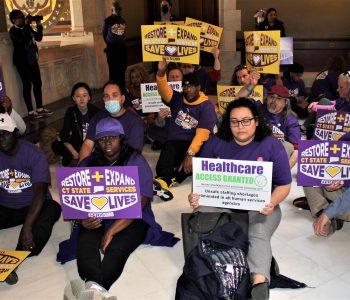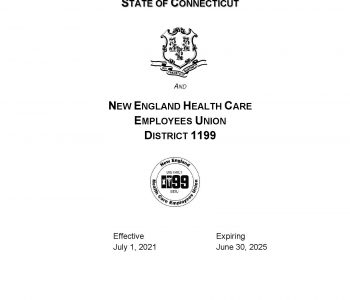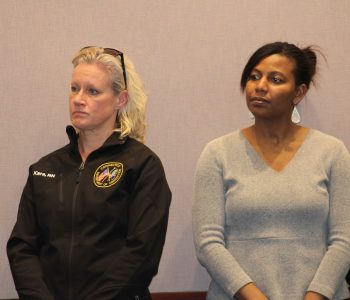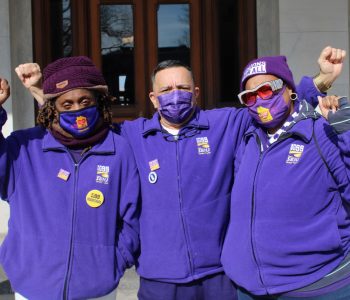Even as the state Department of Correction significantly expands COVID-19 testing of incarcerated people, agency employees say that deep concerns persist about adequate social distancing and medical staffing in Connecticut prisons and jails.
Gabby Bottino, an LPN at Osborn Correctional Institution in Somers, called conditions there “a perfect storm,” adding that the facility struggled with staffing shortages even before the onset of COVID-19.
“We are working with an estimated 20 vacant nursing positions at Osborn, even before this pandemic hit,” she said during a video call Wednesday organized by the unions that represent DOC employees.
Collin Provost, the president of AFSCME Local 391 and a correction officer at MacDougall-Walker Correctional Institution in Suffield, said that the unions representing DOC employees acquired 10,000 masks of their own, due to inadequate supplies from the agency.
“DOC’s failure to properly plan for the COVID-19 pandemic … created volatile conditions within our prisons. The agency was not prepared for the crisis that hit us full in March,” he said.
DOC officials have said that the agency attempted to procure as much protective equipment as possible at the onset of the pandemic but, like many others, faced an international shortage. Weekly mask distributions to staff eventually began and incarcerated people working in manufacturing facilities produced more than 110,000 nonsurgical face masks, which were distributed to other incarcerated people.
As of Friday, at least 789 incarcerated people have tested positive for COVID-19, in addition to 375 staff members, according to data reported by the DOC. Six incarcerated people have died from the virus.
In early April, the DOC began transferring incarcerated people who tested positive for COVID-19 to an isolation unit at Northern Correctional Institution, a maximum-security prison in Somers. According to the DOC, as of Friday, at least 507 incarcerated people infected with COVID-19 have recovered and returned to their original facilities.
The agency began mass testing of incarcerated people on May 13, starting with Osborn Correctional Institute in Somers, where 617 people were tested, resulting in 146 asymptomatic positive results, according to DOC spokesman Andrius Banevicius. The facility was put on lockdown following the surge of positive results last week.
Testing recently began at the Corrigan-Radgowski Correctional Center in Montville, where 1,009 people were tested and results are forthcoming.
“The agency will successively test offenders at each facility until all incarcerated offenders will have had the opportunity to be tested,” Banevicius said Friday.
But many DOC employees and those who are incarcerated fear that COVID-19 is far from under control in the state’s prisons and jails.
“This pandemic is not going away,” Provost said. “Where are the next 10,000 masks and PPE going to come from? Where is the next explosion of positive tests going to pop up and how will the agency respond?”
‘The stress level is high’
Tensions are high in many facilities, several DOC employees said this week. Both employees and incarcerated people are on edge, as fear and confusion pervade prisons and jails. According to some employees, social distancing is often not maintained and some large gatherings are still taking place.
“They’re angry, the stress level is high,” said Steve Wales, a correction officer at Corrigan-Radgowski. He added that there was “no way” that incarcerated people in Radgowski dorms were able to properly socially distance.
“We have 70, 80 of them in a dorm right now. There’s just not enough room for them to all be 6 feet apart,” he said.
Kelly Schafer, a licensed clinical social worker at Carl Robinson Correctional Institution in Enfield, said that as she left the facility Wednesday, she noticed more than 100 incarcerated people in one of the recreational yards, “most of them with no masks on, officers with no masks on.”
“Seemingly we’re supposed to be in a full lockdown, but that doesn’t seem like it’s happening very efficiently or consistently,” she said.
Banevicius said in a statement that small-group outdoor recreation, “with strict adherence to social distancing” was being offered at some facilities, though not those with positive cases of COVID-19.
According to DOC data, at least 75 incarcerated people at Carl Robinson have tested positive for COVID-19 and been transferred to Northern.
Brock Bacote, 27, was released from Brooklyn Correctional Institution in early May, after serving 18 months on a charge of carrying a weapon without a permit. He is now living with family in New Haven, he said.
At Brooklyn, he was housed in a dormitory consisting of 19 cubes in a large room, each containing six people, which he said made it challenging to socially distance. Face masks arrived long after the pandemic had begun, he said.
“We were given one mask apiece but that was after there was multiple confirmed cases inside our facility,” Bacote said. “And that was way after they had said that the masks should be in place if you weren’t able to social distance.”
According to DOC data released Friday, a total of 19 people incarcerated at Brooklyn who tested positive for COVID-19 were transferred to the COVID-19 isolation unit at Northern.
Bacote said he learned about the coronavirus through phone calls with family members and television news shows in the facility. Information about the situation from DOC staff came long afterwards, he said.
“Honestly, I knew from staff going in and out that if the corona wasn’t in our area, that it would soon be,” Bacote said. “With no masks, no social distancing, I was nervous. I knew it was just a matter of time.”
Concerns about social distancing extend to administrative staff as well.
“I worry about my exposure to the virus,” Lindsey Petralito, a medical records clerk at Hartford Correctional Center, said Wednesday. “To enter my office in the heart of the facility, I have to walk by correctional officers, inmates. I also share a bathroom with all of the staff, some of whom have tested positive for COVID-19.”
Petralito questioned why she had not been offered a modified work schedule since many of her tasks, including data entry, could be completed at home through telecommuting.
“I am concerned what will happen in the fall and winter when COVID-19 is expected to be much worse,” she said.
Confusion over test results, temperature checks
Correctional officers described medical staff limitations, haphazard hygiene procedures and confusion over COVID-19 tests and temperature checks in many facilities.
At Osborn, which was placed on lockdown last week, incarcerated people who were negative for COVID-19 had to take outdoor showers, six at a time, Bottino said. In the COVID-19 positive unit, they were “getting a bath basin … and instructed to clean themselves like a bird-bath situation.”
DOC has since expanded its showering policy, permitting those in medical or quarantine units showers every other day, according to The Connecticut Mirror.
Another source of confusion has been the test results themselves. DOC employees at facilities including Corrigan-Radgowski and Cheshire Correctional Institution said that COVID-19 test results were being released to incarcerated people. But at Osborn, it has been “very hectic,” Bottino said, with limited communication to incarcerated people about their test results.
“They’ve been just shuffled around the building,” she said. “They don’t know what their results were.”
Incarcerated people housed in Osborn’s separate unit for those who are COVID-19 positive but asymptomatic are assessed by medical staff every shift, Bottino added. But no new medical staff has been added to the already-thin team.
In response to concerns about medical staff shortages, Banevicus noted that the DOC has added 71 health services staff members in the past year, with 26 hired since March 1.
He also said that all incarcerated people who are tested are “informed by a healthcare staff member of the results of the test for the presence of the novel coronavirus.”
Although the DOC is taking the temperature of all employees entering the building, Sean Howard, a correctional officer at Cheshire Correctional Institution and president of AFSCME Local 387, raised concerns about the accuracy of the devices.
“I’ve been reporting to work and my temperature has never been above 92 degrees,” he said. “I don’t feel confident in the equipment at all. If they’re going by temperature readings, I’m already dead walking into the facility and they’re letting me right in.”
Article from The Hartford Courant
Written by Eliza Fawcett









